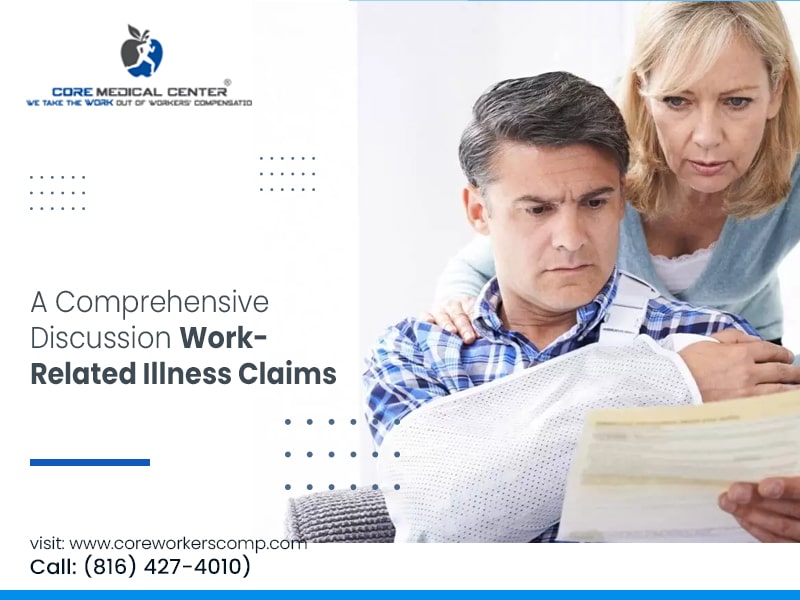Our lives revolve around our work, but what happens when it negatively impacts our health? Even though work-related illnesses can be detrimental to our health, there is hope if you know your rights and know how to file a claim for a work-related illness. We’ll travel through the nuances of Work-Related Illness Claims in this blog, illuminating the way to justice and well-being.
Before we dive into the discussion, if you are looking for the best help with your Workplace Injury Management paperwork or treatment for your work-related injuries, reach out to Core Medical Center, USA, today. So, if you find difficulties in the Workers’ Compensation Appeals paperwork, contact us today.
Now, let’s have a look at the detailed discussion:-
- Understanding Work-Related Illnesses
- Know Your Rights
- Document, Document, Document
- Report Promptly
- Consult a Healthcare Professional
- Legal Guidance
- Keep Communication Lines Open
- Stay Informed Throughout the Process
Understanding Work-Related Illnesses:
Let’s first clarify our terms before delving into the claims world. Illnesses associated with employment are medical conditions brought on by or made worse by exposure to work-related dangers. The spectrum is broad, ranging from illnesses brought on by stress to respiratory problems brought on by exposure to dangerous substances.
Know Your Rights:
Understanding your rights is the first step towards filing a claim for work-related sickness. Learn about the labor regulations in your nation, as they frequently offer rules regarding the benefits to which you can be entitled in the event of a work-related sickness. Since knowledge is a powerful instrument, you can use it to pursue justice in this situation.
Document, Document, Document:
As they say, the devil is in the details, and paperwork is your friend when it comes to filing Work-Related Illness Claims. Above all, keep thorough records of your work environment, any dangerous materials you may have come into contact with, and, most crucially, your medical history. This documentation will serve as your guide during the claims procedure.
Report Promptly:
If you suspect your illness is work-related, don’t procrastinate – report it promptly to your supervisor or HR department. Timely reporting ensures that your claim is well-documented and helps establish a clear link between your health condition and the workplace.
Consult a Healthcare Professional:
Your health is the top priority, so consult a healthcare professional to diagnose and treat your condition. Their medical opinion will be pivotal in supporting your Work-Related Illness Claims. Be open and honest about your work environment and any potential exposures.
Legal Guidance:
Handling the legal ramifications of a sickness at work claim can resemble navigating a maze. Getting legal advice can make all the difference. Speak with a lawyer who focuses on workplace injuries to learn about your rights, evaluate the strength of your case, and assist you with the claims procedure.
Keep Communication Lines Open:
Communication is key in any relationship, including the one with your employer and their insurance company. Keep the lines of communication open and transparent. Notify them promptly, provide requested documentation, and be proactive in updating them on your medical condition and treatment.
Stay Informed Throughout the Process:
The claims process can be a rollercoaster; staying informed is your seatbelt. Regularly check the status of your claim, understand the timelines involved, and be proactive in addressing any queries or concerns that may arise.
Conclusion
While dealing with a work-related sickness can be difficult, knowing how to file a claim can give you some hope. Recognize your rights, take careful notes, file your reports on time, and consult an expert. Your health and well-being come first, and you can ensure justice is done by filing Work-Related Illness Claims. Remember that resources are available to help you find a solution that puts your rights and health first. Contact Core Medical Center, USA, for the best help with Workplace Injury Management.

